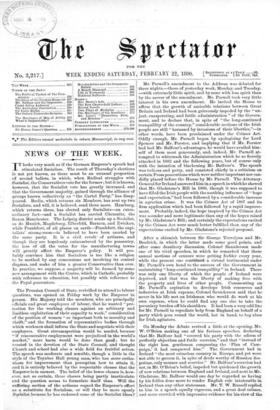Mr. Parnell's amendment to the Address was debated for three
nights,—those of yesterday week, Monday, and Tuesday, —with extremely little spirit, and by none with leas spirit than by the mover of the amendment. Mr. Parnell took very little interest in his own amendment. He invited the House to affirm that the growth of amicable relations between Great Britain and Ireland had been grievously impeded by the " un- just,•exasperating, and futile administration" of the Govern- ment, and to declare that, in spite of "the long-continued tranquillity of the country," considerable sections of the Irish people are still " harassed by invasions of their liberties,"—in other words, have been proclaimed under the Crimes Act. Oddly enough, Mr. .Parnell began by apologising for Lord Spencer and Mr. Forster, and implying that if Mr. Forster had had Mr. Balfour's advantages, he would have availed him- self of them most generously, and, indeed, Mr. Parnell at- tempted to whitewash the Administration which he so fiercely attacked in 1882 and the following years, but of course only with the intention of blackening Mr. Balfour's. The speech was tedious and petty, and consisted chiefly in a criticism on certain Press posecutions which were neither important nor can- didly placed before the House by Mr. Parnell. The Attorney- General for Ireland answered him.in a speech in which he showed that Mr. Gladstone's Bill in 1886, though it was supposed to have filled the Irish people with the soothing influence of " hope and expectation," had been followed by a considerable increase in agrarian crime. It was the Crimes Act of 1887 and its firm application which had been followed by a rapid improve- ment. Probably, indeed, the hope inspired by the Crimes Act was sounder and more legitimate than any of the hopes raised by Mr. Gladstone's Bill; and certainly the expectations excited by the Crimes Act were much better fulfilled than any of the expectations excited by Mr. Gladstone's rejected proposal.






































